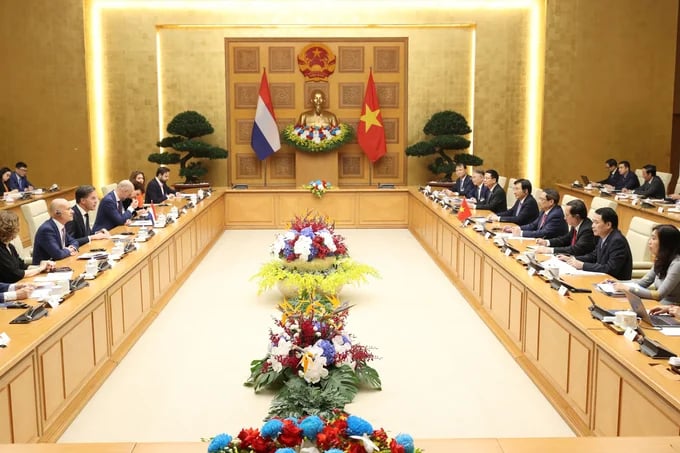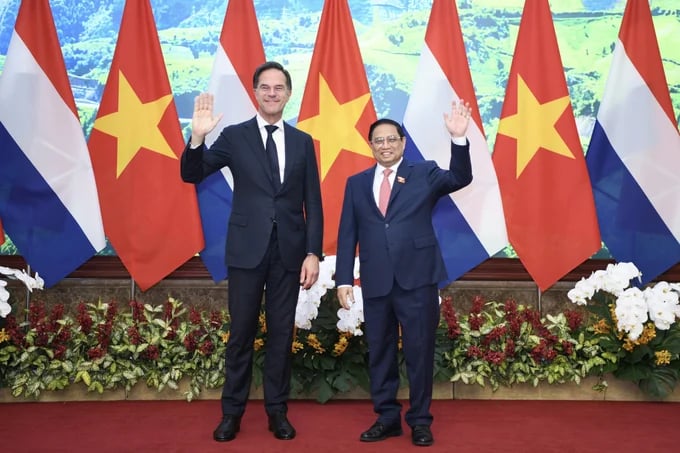November 25, 2025 | 09:36 GMT +7
November 25, 2025 | 09:36 GMT +7
Hotline: 0913.378.918
November 25, 2025 | 09:36 GMT +7
Hotline: 0913.378.918

The Dutch Prime Minister affirmed that he would support Vietnam in responding to climate change, developing fisheries, and converting agriculture in the Mekong Delta. Photo: Quang Phuc.
On the morning of November 2, after the official welcoming ceremony, Prime Minister Pham Minh Chinh held talks with Dutch Prime Minister Mark Rutte.
Prime Minister Pham Minh Chinh emphasized that Prime Minister Mark Rutte’s visit (for two days, November 1-2) has significance on the occasion of the two countries celebrating the 50th anniversary of establishing diplomatic relations (1973-2023), contributing to promoting the Vietnam - Netherlands Comprehensive Partnership.
Meanwhile, the Dutch Prime Minister affirmed that Vietnam is a prioritized partner of the Netherlands in the Indo-Pacific region. He expressed joy in officially visiting Vietnam for the third time and meeting Prime Minister Pham Minh Chinh again after nearly a year since the Vietnamese Prime Minister’s official visit to the Netherlands in December 2022.
The two Prime Ministers agreed to enhance political trust by exchanging high-level delegations and continuing to deploy bilateral cooperation mechanisms and agreements effectively. Furthermore, researching and establishing new mechanisms will deepen cooperation between the two countries.
Both sides affirmed that economics and trade are essential pillars of the two countries’ relationship. They agreed to continue to fully and effectively implement the Vietnam - EU Free Trade Agreement (EVFTA).
Prime Minister Pham Minh Chinh welcomed the delegation of nearly 30 leading Dutch high-tech enterprises accompanying Prime Minister Mark Rutte. Their presence contributes to realizing cooperation opportunities between the two countries. Prime Minister Pham Minh Chinh asked the Netherlands to support the EC to soon remove the “IUU yellow card” for Vietnam’s seafood exports, early ratification of the Vietnam - EU Investment Protection Agreement (EVIPA), and encourage Dutch businesses to promote investment in Vietnam, especially in Netherlands’ vital areas such as high technology, seaports, and strategic infrastructure.
The Dutch Prime Minister emphasized that Dutch businesses are interested in Vietnam’s political stability and favorable investment and business environment. He agreed to actively accelerate the process of ratifying the EVIPA Agreement. He also appreciated Vietnam’s efforts in developing sustainable fisheries and affirmed that they will continue to coordinate closely with EU member countries to support Vietnam in this issue.
The two leaders agreed to continue promoting the Strategic Partnership framework on climate change adaptation, water management, and sustainable agriculture, contributing to responding to global challenges.
Notably, cooperation in the fields of offshore sand exploitation, green economic development, circular economy, urban response to climate change, and training of high-quality human resources on climate change and water resources management, irrigation, and natural disaster prevention.

Prime Minister Pham Minh Chinh proposed to the Dutch that a trilateral cooperation mechanism on agriculture be established, contributing to solving global food security issues. Photo: Quang Phuc.
Prime Minister Pham Minh Chinh asked the Netherlands and G7 countries to support Vietnam in technology, finance, human resources, and institutional improvement to effectively deploy the Just Energy Transition Partnership (JETP). In doing so, the two countries will establish a trilateral cooperation mechanism on agriculture, contributing to solving global food security issues.
Prime Minister Pham Minh Chinh congratulated the Netherlands on becoming a development partner of the ASEAN, and expressed his hope that the European country will engage more deeply in and giving more initiatives to the promotion of the ASEAN-EU relations in general and the ASEAN-Netherlands relationship in particular.
The Prime Minister of the Netherlands expressed his interest in supporting the Mekong Delta region to respond to climate change, affirming his support for Vietnam in implementing the Mekong Delta Plan for the period 2021–2030, Vision 2050. He also supported the sustainable agriculture transformation plan in the Mekong Delta, as well as completing the legal framework for water resource management.
The two sides also emphasized science, technology, and innovation as breakthroughs. They agreed to maximize the potential for cooperation between the two countries in high technology, electronic circuit production, semiconductor devices, building digital platforms and telecommunications ecosystems, digital transformation, and human resource development.
The two leaders agreed to expand cooperation in potential fields such as exploration and sustainable development of important minerals; defense security; customs; shipping; logistics; and people-to-people exchanges.
Also during the meeting, the two Prime Ministers had extensive discussions on international and regional issues of mutual concern. They agreed to continue coordinating and supporting each other at international and regional organizations, especially the United Nations, the ASEAN - EU framework, etc.
Translated by Quynh Chi

(VAN) ILDEX Vietnam 2026 will connect more than 250 exhibitors and 10,000 visitors from 40 countries.

(VAN) Hue City is accelerating efforts to combat IUU fishing, aiming to remove EC’s 'yellow card' and promote sustainable fisheries development.

(VAN) The recent torrential downpours and unprecedented flooding in the Southern Central Coast are a highly unusual meteorological and hydrological event.

(VAN) The Southern Central Coast and Central Highlands regions have suffered massive agricultural losses, with over 80,000 hectares of rice and crops, alongside millions of livestock, being swept away, causing severe damage to farmer livelihoods.

(VAN) Trieu Son commune deploys a 'virtual assistant' to help residents complete administrative procedures.

(VAN) Applying green technology in rural water supply and sanitation helps improve resource efficiency, protect the environment, and enhance community living standards.

(VAN) Developing biosecure livestock production is the key that helps Tuyen Quang form linked chains in livestock production and build its brand in the market.